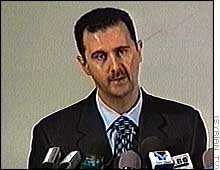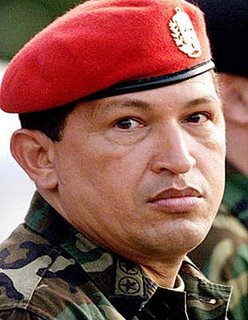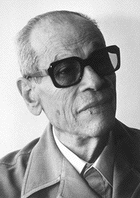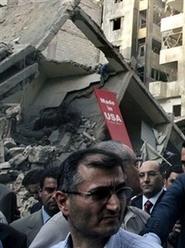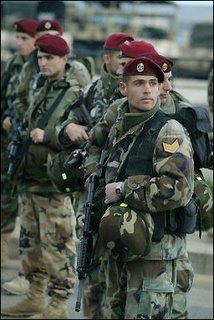This is an essay a close friend of mine - Hassan Harajli - wrote straight after the ceasefire... I thought I'd post it here for all of you to read and analyse...
Amongst other issues we Lebanese must address, Hassan discusses a solution to Hizbollah's military wing in the Lebanese Army which is truly insightful...
-----------------------------------------------------------Exchanging Roles?
I am not a political analyst or a historian in profession, yet there are some challenging questions out of this latest war between Lebanon and Israel. Who won? At what cost? Who was to blame? Is it over or would there be yet another conflict on Lebanese soil? What will happen next? Would Lebanon survive this Israeli aggression economically, and so on…?
Hizbullah has proven, as a local political party with a military wing, supported financially and militarily by its’ ideological strategic ally, Iran, that it could withstand one of the world’s mightiest and modern military machines through sheer internal organization, by coming from and fighting for the land they are on, by the knowledge of the enemy’s capacities and capabilities, the acquisition of appropriate military hardware (albeit missing the ground to air missiles) to resist, and a faith in God and in fighting on the cause of Justice.
In this aspect Hizbullah has come out more or less victorious. The victory is one that is both national in nature and yet more importantly regional. Regional in a sense that it has sent shockwaves across the Arab world whose leaders have all, more or less, been inflected by an inferiority complex when it comes to Israel from one angle, and been taken forever captive by economic and commercial interests with the U.S (to say the least), denying them the ability to maneuver politically to even dispel the Israel ambassador in their land (for example). Hizbullah has proven that the Israel army is not an invincible machine, yet with strenuous preparation, organization, proper armaments, and faith, it could be put to a stop, so not to say defeated.
Herein, Hizbullah has stood up to a nation that has flouted almost every UN Council Resolution, undertaken every possible atrocity against humanity throughout history, and has considered itself above international law, and more frighteningly, above all the peace negotiations with the Arabs, while the Arabs are left to moan about rights, international law, Council resolutions, justice, ‘but this, but that’… And Israel does whatever extremity it sees fit to ensure that the Arabs, including the Palestinians, stay weak and divided, within the so-called ‘New Middle East’ perhaps – all under the pretext of combating ‘terrorism’ and under their flawed terminology of ‘self defense’.
Yet in my opinion, the victory of Hizbullah is a victory for the Arabs only to the extent of emotion and semi-retrieved pride, yet is a potential defeat in that its accomplishments, especially of late, stem not from an Arab nation and its institutions as a whole, yet from an almost independently run political party with semi-autonomy from the central government (albeit it represents almost a third of the Lebanese population).
I say potential defeat because though the dichotomy between Hizbullah and the Lebanese Central Government served well in the past to limit Israel’s disproportionate firepower to Hizbullah and not the whole Lebanese state, it cannot proceed as it is, and as Hizbullah wishes it should, for two primary reasons.
The first reason is that this military achievement and self-confidence booster to the Arab peoples should be invested in the Lebanese government. Strength of nations surrounding Israel should no longer be viewed as a taboo or an impossibility. What harm would it bring if Hizbullah gave its important military arsenal to the Lebanese army and trained the army about its historic methods in combating Israel? Why not include a strong regiment (of Hizbullah soldiers) in the army that applies ‘guerrilla’ warfare tactics, especially when a ‘classical’ army is absolutely useless in front of Israel? Why not arm the Lebanese army the same way that it has been armed, and teach it the same perseverance and decentralized command system of the Hizbullah soldiers? Some may say that that would produce an Israeli aggression on all of Lebanon, but that has already happened in this July-August war. If Hizbullah does not give its victory and its assets to the Lebanese army, with an agreed upon time-frame, then it is a failure, nothing more and nothing less. A failure that entails that Hizbullah’s achievements are beyond the scope and ability of any Arab government. This duplicity of resistance and government should be replicated throughout the Arab world in order to defeat Israeli aggressions.
The second reason is economic. Herein perhaps my opinion is a little bias towards the type of class I belong to (a middle class citizen) and the profession category which makes for my living (the Small and Medium Sized Enterprises - SMEs). Yet no business activity in Lebanon has been spared this time around, and the numbers (including myself) who are now lined at embassies for immigration purposes are greater than they were before, and they were abundant before. Who will compensate? Inevitably every built house in the South, South of Beirut, Bekaa… would be given money for reconstruction, yet what about all those SMEs? Can they for example show their past yearly and monthly balance sheets and be compensated for the direct damage caused and compensated for opportunities forgone? These SMEs are after all, the economic backbone of any prospering nation.
On this note as well, it is totally unacceptable that Hizbullah or any other party be allowed to compensate for the damages of this war (through its regional allies) unless Hizbullah accepts to become the government and the government a political party. All aid to the Lebanese people affected by this war must be done through governmental channels or at least through coordination with the central government, of which Hizbullah is a part. No longer should Hizbullah hold a semi-governmental character, and all its assets, both financial and military should be transferred through the government. Or else why is there a government?
Finally, a further important issue to rise would be seeing Israeli politicians and generals fighting it out in Israel, blaming and criticizing each other for all their failures in this foolish war they initiated, and the expectation that their prime minister will fall. To some in Lebanon, this is seen as a victory, a victory that should ensure that such events do not occur, at least in public, between the Lebanese.
However, I see this as democracy. Israel is practicing democracy were actions are held accountable and though who have not done their jobs correctly, would be penalized by the system in place. In this sense, if the prime minister falls out in Israel, it is not a victory for us as much as a victory for their system of checks and balances.
In Lebanon, no voice should be silenced this way, silenced by blaming him or her of serving the Zionist state. This would be a crime in itself, a stopping of a nation that holds itself high in terms of discourse and harmony between sects and political parties - A crime against free expression of speech and progress.
I can only hope now that Hizbullah, and on whose southern lands they come from would rise to this golden opportunity to reveal its national character, which I always believed in, and play a vital role in strengthening the central government. Otherwise and again, Hizbullah should become the government and the government a political party.
Now the war should be next fought on lands which are still invaded, particularly Syria (as it is continuously in Palestine), and it is a message that Hizbullah takes to those lands that should be listened too and applied, not met by empty speeches praising Hizbullah and Lebanese blood as a model, and even getting political leverage from it, and yet go on in doing nothing for their own dignity, land and people except ensuring the survival of a Machiavellian elite.
HASSAN HARAJLI
